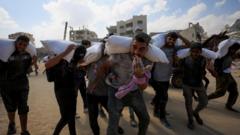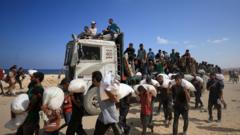In a move that exacerbates tensions between Israel and international humanitarian organizations, the Israeli government has refused to renew the visa of Jonathan Whittall, a senior UN official overseeing humanitarian operations in Gaza, citing allegations of bias.
Israel Denies Visa Renewal to UN Humanitarian Chief Amid Gaza Crisis

Israel Denies Visa Renewal to UN Humanitarian Chief Amid Gaza Crisis
Strained diplomatic relations escalate as Israel halts visa for U.N. official criticizing military actions.
Israel's recent refusal to extend the visa of Jonathan Whittall, acting head of the UN Office for the Coordination of Humanitarian Affairs (OCHA), has further strained diplomatic relations between the Israeli government and international bodies. Whittall, who has been vocal in his criticism of Israel’s military operations in Gaza, particularly regarding the impact on civilians, will be barred from continuing his work beyond August, according to Israeli Foreign Minister Gideon Saar.
Saar accused Whittall of exhibiting “biased and hostile conduct” towards Israel, a claim reiterated after a series of remarks from the UN official concerning the rising civilian death toll related to Israel's military actions. In a recent statement, OCHA emphasized that addressing the dire humanitarian situation was fundamental to its mission and condemned Israel's pressure on humanitarian access as an ongoing threat.
The situation on the ground continues to deteriorate, with recent clashes leading to numerous Palestinian casualties following Israeli fire near aid distribution points. The humanitarian crisis in Gaza has escalated dramatically over the past two years of conflict, ignited by a major Hamas attack on Israel in October 2023. According to Gaza health officials, more than 57,000 individuals, many of whom are civilians and children, have been killed during the ongoing hostilities.
With a significant number of Gazans displaced and facing acute food shortages—reported by the World Food Program as affecting nearly one-third of the population—Whittall's criticisms highlight the perceived humanitarian neglect amidst military operations. He has described the current situation in Gaza as “weaponized hunger,” drawing attention to the dire straits faced by those caught in the conflict.
In this evolving narrative, the interplay between humanitarian aid and military operations remains a crucial aspect of the ongoing conflict, with international responses likely to grow more vocal as the situation develops further.
Saar accused Whittall of exhibiting “biased and hostile conduct” towards Israel, a claim reiterated after a series of remarks from the UN official concerning the rising civilian death toll related to Israel's military actions. In a recent statement, OCHA emphasized that addressing the dire humanitarian situation was fundamental to its mission and condemned Israel's pressure on humanitarian access as an ongoing threat.
The situation on the ground continues to deteriorate, with recent clashes leading to numerous Palestinian casualties following Israeli fire near aid distribution points. The humanitarian crisis in Gaza has escalated dramatically over the past two years of conflict, ignited by a major Hamas attack on Israel in October 2023. According to Gaza health officials, more than 57,000 individuals, many of whom are civilians and children, have been killed during the ongoing hostilities.
With a significant number of Gazans displaced and facing acute food shortages—reported by the World Food Program as affecting nearly one-third of the population—Whittall's criticisms highlight the perceived humanitarian neglect amidst military operations. He has described the current situation in Gaza as “weaponized hunger,” drawing attention to the dire straits faced by those caught in the conflict.
In this evolving narrative, the interplay between humanitarian aid and military operations remains a crucial aspect of the ongoing conflict, with international responses likely to grow more vocal as the situation develops further.





















